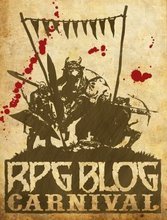Here’s a list of several RPGs and the genres fit into. Some games are harder to classify than others, so you may not agree with my placement; as always, YMMV. Also, a few games fit more than one genre. In this case, I’ve placed them in all genres I feel are appropriate.
Animals (You play animals)
- Bunnies and Burrows
- Critter Commandos
- Furry Pirates
- Justifiers
- Mouseguard
- Teenage Mutant Ninja Turtles
Anime
- Big Eyes, Small Mouths
- In Nomine: Anime
- Teenagers From Outer Space
Cartoon
- Bullwinkle and Rocky Role-Playing Party Game
- Elfquest
- Teenage Mutant Ninja Turtles
- Toon
Fantasy (also called “High Fantasy”, “Straight Fantasy”)
- 7th Sea
- AGE
- Amber Diceless RPG
- Arcanum
- Arduin
- Aria
- Ars Magica
- Burning Wheel
- Castles & Crusades
- Chivalry and Sorcery
- Conan
- Dangerous Journeys
- DragonQuest
- DragonRaid
- Dungeons and Dragons (all editions)
- Earth Dawn
- Elfquest
- Elric
- Empire of the Petal Throne
- Everway
- Exalted
- Fantasy Hero
- Furry Pirates
- HackMaster
- Harn
- Iron Claw
- Lace and Steel
- Lord of the Rings
- One Ring
- OSRIC
- Man, Myth, and Magic
- Middle Earth Role Play
- Palladium
- Pathfinder
- Pendragon
- RoleMaster
- RuneQuest
- Talislantia
- Top Secret
- Tunnels and Trolls
- Warhammer Fantasy Roleplay
- Ysgarth
Historical (includes SF and fantasy firmly grounded in a historical periods)
- Adventure (1920’s)
- Ars Magica (Medieval; Fantasy)
- Bushido (Feudal Japan)
- Call of Cthulhu (1920’s; Horror)
- Castle Falkenstein (Victorian; Fantasy)
- Gangbusters (1920’s)
- Gaslight (Victorian)
- Indiana Jones (1920’s)
- Lace and Steel (Cavalier)
- Legend of the Five Rings (Feudal Japan)
- Mouseguard (Medieval)
- Pendragon (Medieval)
- Qin (China, Warring States period)
- Space 1889 (Victorian; SF)
- Vampire: Dark Ages
- various GURPS supplements, including Japan, Russia, China, etc.
- Victoriana (Victorian)
- Werewolf: Wild West
Horror
- All Flesh Must Be Eaten
- Call of Cthulhu (and it’s off-shoots such as Cthulhu by Gaslight, Cthulhupunk, etc.)
- Chill
- Deadlands
- GURPS Horror
- It Came From the Late, Late Show
- Kult
- Little Fears
- Necroscope
- Nephilim
- Nocture
- Ravenloft (AD&D and d20)
- Unknown Armies
- Whispering Vault
- World of Darkness
- Zombi
Humor
- Bullwinkleand Rocky Role-Playing Party Game
- Bureau 13
- Ghostbusters RPG
- HoL
- Macho Women with Guns
- Murphy’s World
- Pandemonium
- Paranoia
- SLUG
- Stuporpowers
- Tales of the Floating Vagabond
- Teenage Mutant Ninja Turtles
- Teenagers From Outer Space
- Toon
Modern
- Bureau 13
- Dream Park
- Dresdan Files
- Etherscope
- Feng Shui
- Gumshoe
- Immortal
- In Nomine
- James Bond 007
- Macho Women with Guns
- Mercenaries, Spies, and Private Eyes
- Ninjas and Superspies
- Nobilis
- Over the Edge
- Pandemonium
- Scion
- Stargate SG-1
- Teenage Mutant Ninja Turtles
- Twilight 2000
- World of Darkness (Vampire, Werewolf, Mage, Wraith/Ghost, Changeling, Hunter, etc.)
- Unknown Armies
- X-Crawl
Near Future
- Aberrant
- Cybergenereation
- Cyberpunk
- Judge Dredd
- Shadowrun
- Teenagers From Outer Space
- Trinity
- Underground
Post-Apocolyptic
- Aftermath!
- Darwin’s World
- Gamma World
Science Fiction
- 2300 AD
- Alternity
- Blue Planet
- Darwin’s World
- Dr. Who
- Fading Suns (D&D)
- Gamma World
- HoL
- Jovian Chronicles
- Justifiers
- Mekton
- Murphy’s World
- Paranoia
- Serenity
- Skyrealms of Jorune
- SpellJammer (D&D)
- Star Trek
- Star Wars
- Tales of the Floating Vagabond
- Traveller
- Trinity
- Universe
Spies (Espionage)
- James Bond 007
- Mercenaries, Spies, and Private Eyes
- Ninjas and Superspies
- Top Secret
Steampunk/Victorian
- Castle Falkenstein
- Cthulhu by Gaslight
- Gaslight
- Space 1889
Superhero
- Aberrant
- Champions
- DC Heroes
- DC Universe Roleplaying Game
- Marvel Superheros
- Mutants and Masterminds
- Stuporpowers
- Villians and Vigilantes
Westerns
- Boot Hill
- Deadlands
Licensed Games (based on books, movies, or TV shows)
- Amber Diceless RPG (Amber series by Roger Zelazny)
- Bullwinkle and Rocky Role-Playing Party Game
- Conan
- Dr. Who (Dr. Who TV series)
- Dresdan Files (Dresdan Files books and TV)
- Elfquest
- Elric
- Ghostbusters RPG
- Lord of the Rings
- Middle Earth Role Play
- One Ring (Lord of the Rings)
- Serenity (Firefly TV series and Serenity movie)
- Space Opera
- Star Frontiers
- Stargate SG-1
- Star Trek
- Star Wars (Star Wars franchise)
- Teenage Mutant Ninja Turtles
- TWERPS
Generic or multiple genres
- d20
- Amazing Engine
- Dream Park
- FATE
- FUDGE
- GURPS
- Hero System
- Rifts
- Savage Worlds
- SLUG
- TORG
- TWERPS
Of course, this is by no means and exhaustive list. I concentrated on games available in the US, mostly because I’m not familiar with any others. Even so, I’m sure I’ve forgotten someone’s favorite game; if so, leave me a comment and I’ll include it in a revised list.
Related articles
- 5 Tabletop RPGs You Can Download For Free [MUO Gaming] (makeuseof.com)











![Reblog this post [with Zemanta]](http://img.zemanta.com/reblog_c.png?x-id=8bf58850-5515-496c-ae21-82a2c87946bf)
 We all get them: the incessant rules lawyer who challenges your every call; the “loopholer” who will exploit everything not nailed down in the rules to gain that extra +1 advantage; the player who takes everything that happens to their character as an attack on themselves…
We all get them: the incessant rules lawyer who challenges your every call; the “loopholer” who will exploit everything not nailed down in the rules to gain that extra +1 advantage; the player who takes everything that happens to their character as an attack on themselves…



